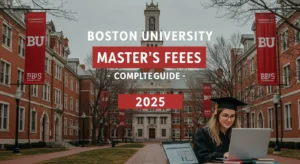Boston University (BU) is one of the leading private research institutions in the United States, offering a wide range of master’s programs in fields such as business, engineering, law, education, health sciences, and more. Every year, thousands of students from around the world apply to BU for graduate studies, attracted by its academic excellence, world-class faculty, and global reputation.
If you’re planning to pursue a master’s degree at Boston University, one of the most important things to understand is the Boston University master’s program fees. Graduate education is a significant financial investment, and understanding the cost breakdown can help you plan your future more effectively.
In this article, we’ll break down the Boston University master’s program fees, explain the financial aid opportunities, and answer some frequently asked questions to guide you through your decision-making process.

Overview of Boston University Master’s Program Fees
The Boston University master’s program fees vary depending on the school, program, and number of credit hours required for completion. On average, master’s students at BU can expect to pay:
| Program | Tuition Per Credit Hour (2025) | Estimated Total Program Fee |
|---|---|---|
| College of Engineering | $1,940 | $58,200 – $77,600 |
| Questrom School of Business (MBA) | $2,040 | $91,800 – $102,000 |
| School of Education (Wheelock) | $1,830 | $43,920 – $54,900 |
| College of Communication | $1,880 | $45,120 – $56,400 |
| School of Law (LLM Programs) | $2,030 | $61,000 – $65,000 |
| School of Public Health | $1,870 | $53,000 – $62,000 |
💡 Note: Fees are based on the 2024-2025 academic year and may be subject to change annually. Some programs charge flat rates instead of per-credit fees.
Additional Costs Beyond Tuition
While tuition forms the largest part of the Boston University master’s program fees, students should also budget for the following expenses:
1. Student Services and Health Fees
-
Student Services Fee: Approximately $500 per semester
-
Health and Wellness Fee: Around $400 per semester
-
Medical Insurance: Roughly $3,300 per year (can be waived with proof of private insurance)
2. Living Expenses
-
Housing (on-campus/off-campus): $12,000 – $18,000 per year
-
Food and Meals: $3,000 – $5,000 per year
-
Transportation & Personal Expenses: $2,000 – $4,000 per year
-
Books and Supplies: $1,000 – $2,000 annually
Total Estimated Living Costs: $18,000 – $28,000 per year
Scholarships and Financial Aid Options
To ease the financial burden of the Boston University master’s program fees, the university offers a variety of funding opportunities:
1. Merit-Based Scholarships
Many BU graduate schools offer partial tuition waivers and scholarships to outstanding applicants based on academic achievement and leadership potential.
2. Graduate Assistantships
Some departments offer research or teaching assistantships that include a tuition waiver and a monthly stipend.
3. Need-Based Financial Aid
Though limited for international students, U.S. citizens and permanent residents may qualify for federal student loans and BU-specific aid.
4. External Scholarships
Students are encouraged to apply for external funding sources, such as Fulbright Scholarships, DAAD (for German students), and private foundations.
Cost-Effective Study Tips
-
Apply Early: Early applicants are more likely to receive financial aid offers.
-
Choose a Shorter Program: Some master’s programs can be completed in 12–16 months, which reduces living expenses.
-
Opt for Online or Hybrid Models: BU offers some online master’s programs that cost less than on-campus options.
-
Work While Studying: International students can work up to 20 hours per week on campus.
Why Invest in a Boston University Master’s Degree?
Despite the high Boston University master’s program fees, the return on investment is strong. Here’s why:
-
Career Opportunities: BU has strong employer connections in Boston, a major hub for finance, biotech, and education.
-
Global Recognition: A BU degree opens doors to career opportunities worldwide.
-
Alumni Network: Over 300,000 BU alumni globally offer networking and mentoring possibilities.
-
Quality of Education: BU consistently ranks among the top 50 universities in the U.S.
Tips to Manage Your Finances as a Graduate Student
-
Create a detailed budget that includes tuition, living expenses, and emergency funds.
-
Look for part-time internships or freelance work relevant to your field.
-
Use student discounts for public transport, food, and entertainment.
-
Share accommodation with other students to cut down on rent.
-
Apply for all eligible scholarships and grants.
FAQs About Boston University Master’s Program Fees
1. What is the average cost of a master’s degree at Boston University?
The average total cost ranges from $55,000 to $100,000 depending on the program and number of credit hours.
2. Does Boston University offer financial aid for master’s students?
Yes, BU offers merit-based scholarships, assistantships, and limited need-based aid for graduate students.
3. Can international students get scholarships at Boston University?
Yes, although competitive, BU provides scholarships and assistantships to highly qualified international students.
4. Are there any fully funded master’s programs at BU?
Some research-based master’s programs offer full funding via assistantships, especially in engineering and sciences.
5. How often do the tuition fees increase at Boston University?
Typically, tuition increases by 3%–5% annually. It’s best to check BU’s official tuition rates each academic year.
6. Can I pay my tuition in installments?
Yes, BU offers payment plans for students who prefer to pay fees in monthly installments.



